1. AUSTRALIA
▲ 1
As statements of intent go, it was quite something. England were blown away by a side that can scrummage, dominate the breakdown – which was always going to be crucial at this tournament - and dazzle with their backline. Bernard Foley won plaudits for his imperious fly-half display but Matt Giteau’s influence, from just outside him at No12, cannot be overstated. As a number of his former players have pointed out Michael Cheika is not a man to have a robust conversation with and in demanding that Giteau was available for selection he has shaped Australia into World Cup contenders. Against Wales they do not have Michael Hooper but that they are able to bring in Sean McMahon mocks England’s paucity of opensides. They also have 10 straight wins over Wales and when Australia have their tails up they are extremely difficult to beat.
Australia’s 33-13 victory was their biggest ever victory over England at Twickenham, eclipsing the 16-point win in 1984.
Next match v Wales, Saturday 10 October (Pool A)
2. NEW ZEALAND
▼ 1
It almost feels as if they are doing it on purpose, and to an extent, perhaps they are. As Steve Hansen said after their “blood ugly” win over Georgia, the All Blacks are holding plenty back, wary that previous World Cup campaigns have seen New Zealand show their hand too early. Nonetheless, Dan Carter endured a torrid night against Georgia with some pretty shocking kicking both from tee and hand, and the amount of handling errors was staggering. It probably did not help that at times they were trying to do things at 100 miles an hour but the upshot is that they were tested by Georgia, particularly at the scrum. Richie McCaw takes a breather against Tonga on Friday, probably wise as this fixture stirs something in their opponents, before a quarter-final in Cardiff, potentially a long-awaited rematch against France.
Against Georgia New Zealand missed just four tackles – one fewer than the opposing fly-half Lasha Malaghuradze.
Next match Georgia, Friday 9 October (Pool C)
3. FRANCE
▶◀
Historically, the only thing predictable about France was their unpredictability but after three muscular if uninspiring victories over sides they would expect to beat comfortably, using similarly direct tactics, they seem a little, well, predictable. So what does Philippe Saint-André have up his sleeve for Ireland? If it becomes a forward struggle, both sides are evenly matched and the scoreboard will be close while both have considerable talent behind the scrum but have shown it only in glimpses so far. But Freddie Michalak may be the answer. He played with pizzazz against Canada and likes facing Ireland, conjuring sublime performances against them at both the 2003 and 2007 World Cups. Whether he has a third at his fingertips will go a long way to determining who faces the All Blacks.
The last seven matches between France and Ireland have been decided by seven points or fewer and there have been two draws, in 2012 and 2013.
Next match v Ireland, Sunday 11 October (Pool D)
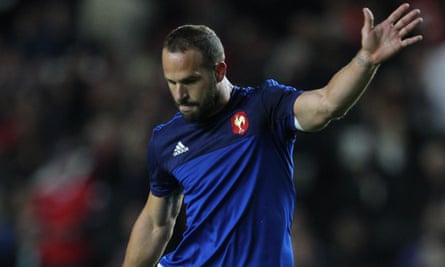
4. SOUTH AFRICA
▲ 3
When the dust eventually settled on their humiliating defeat to Japan, it became apparent that the Springboks had been stirred from their slumber. After dispatching Samoa, ruthless victories over Scotland and USA have followed, along with top spot in Pool B, and neither Wales or Australia will fancy them in the quarter-finals. The latest victory was a 64-0 romp against a largely second-string USA but the demonic manner in which the back row dealt with Samu Manoa’s ball-carrying threat showed a South Africa side back to doing what it does best. The returns to the starting XV of Duane Vermeulen and Fourie du Preez have brought ballast and tactical nous respectively while Bryan Habana’s finishing means they are always a threat. They will have to improve to claim a third World Cup title but so will most of the other contenders. Write them off at your peril.
Bryan Habana joined Jonah Lomu on 15 World Cup tries with a hat-trick against USA and pulled level with David Campese on 64 in the all-time list.
Next match TBC, Saturday 17 October (quarter-final)
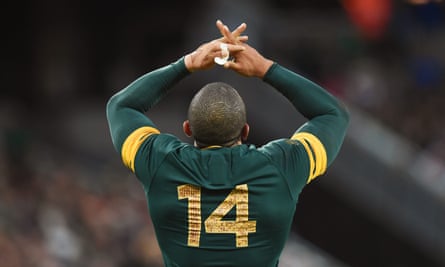
5. ARGENTINA
▲ 1
Pre-tournament dark horses playing like thoroughbreds, Argentina continue to impress and their place in the last eight will be rubberstamped by New Zealand on Friday. Perhaps they are benefiting from the attention the All Blacks command. Argentina gave them an almighty scare but Richie McCaw’s mindless yellow card dominated afterwards. That the loser of France v Ireland faces New Zealand has also occupied column inches but neither will relish the prospect of facing the Pumas, not least after both lost to Argentina in 2007. The wings we knew all about but Daniel Hourcade will be particularly pleased with the performance of the fly-half Nicolás Sánchez in victory over Tonga, nearly as pleased as the watching Diego Maradona.
After his haul of 25 against Tonga, Sánchez is currently the tournament’s top points scorer with 51.
Next match Namibia, Sunday 11 October (Pool C)
6. IRELAND
▼ 2
Three wins from three but a fluctuation in form has supporters torn over their side’s chances. On one hand, Ireland’s set piece is as sturdy as anyone’s and when it comes to attack, Joe Schmidt, like his countrymen, has been holding something back. Conor Murray and Jonathan Sexton have been quiet hitherto but the theory goes that Schmidt has his cards close to his chest. The other argument is that Ireland have cruised past Canada and Romania, as they would be expected to, but were laborious against Italy and will be shown up by France. Perhaps it is a good thing that coaches rather than players have been the key protagonists in this tournament so far. Their most dangerous weapon seems to be the omniscient Schmidt rather than anyone in their starting XV.
Keith Earls scored his eighth World Cup try against Italy to become Ireland’s most prolific try-scorer in the tournament’s history.
Next match France, Sunday 11 October (Pool D)
7. WALES
▼ 2
It was palpably clear that by defeating England Warren Gatland felt vindicated for maintaining his insistence that his side could escape Pool A – the inference being that Wales were considered the likely fall guys and Gatland used such a viewpoint to motivate his squad. It clearly worked. Gatland continues to get the best out of a shallow if talented pool of players but the question, now they have reached the last eight, is how far can they go? Wales’s selection to face Australia is further credit to their coach. England, somewhat arrogantly, refused to pick personnel to cope with the twin breakdown threat of “Pooper” but Wales will fight fire with fire having brought in Justin Tipuric to play alongside Sam Warburton. Their recent record against Australia is awful but as Warburton pointed out after victory at Twickenham, last autumn’s win over South Africa has given Gatland’s side enormous self-belief.
Gareth Davies needs a try against Australia to become the second Welshman in history to score in all four pool matches after Shane Williams did so in 2007.
Next match Australia, Saturday 10 October (Pool A)
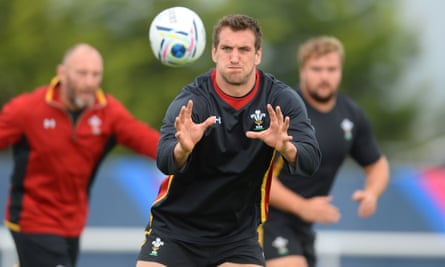
8. SCOTLAND
▶◀
As was predicted before the start of the tournament, Scotland’s hopes of qualification rest on their showdown with Samoa in Newcastle on Saturday. It was expected to be a shootout between the two but instead Scotland face a pretty woeful Samoa side who look like they are desperate for their campaign to end. The fact that it is Japan also competing for second place in Pool B means the neutral support is with Samoa but Scotland should prove too strong. Vern Cotter made plenty of changes but his side showed up for large spells against South Africa, were within 10 points with 20 minutes to go and with Finn Russell and John Hardie back to face Samoa, a last-eight place is theirs for the taking.
Scotland are joint seventh in the try-scoring ranks but Greig Laidlaw currently has the most conversions with eight.
Next match Samoa, Saturday 10 October (Pool B)
9. JAPAN
▶◀
The professionalism with which they resoundingly beat Samoa expunged any doubts as to whether Japan were one-hit wonders and pointed the finger squarely at World Rugby – their heavy defeat to Scotland, after just four days’ rest, is looking like it will cost them a quarter-final place. In many ways though, the win over Samoa was better than that against South Africa. It was comprehensive and while the refusal to go for a bonus point until the very closing stages was somewhat confusing, it is unlikely to matter – either way Japan need Samoa to beat Scotland. Should Japan fail to reach the last eight it is imperative that, despite Eddie Jones’s departure, their development is not allowed to slow. That would be a crime worse than that of the schedulers.
Japan’s victory over Samoa was the first time in World Cup history that they have won two matches at a single tournament.
Next match USA, Sunday 11 October (Pool B)
10. ENGLAND
▼ 1
Things are beginning to get messy. Mike Catt’s flare-up with Danny Cipriani has been confirmed by the RFU while James Haskell has been been going at it hammer and tongs with Neil Back. Not even a cricket score against Uruguay will paper over the cracks. It was against Wales that England got it horribly wrong but the Wallabies exposed just how far England are from the top two in the world, which is where the RFU felt it should be by now. Bernard Foley’s first try was good, his second a thing of beauty, rooted in simplicity but executed with the speed and polish to which England can only aspire. Stuart Lancaster’s mistakes are manifold but chief among them was to take a side with such attacking intent at the end of the Six Nations and revert to historical English type without the muscle or nastiness to back it up. He sorted out one unholy mess post-2011 but he is probably not the man to clean up his own.
Owen Farrell and Henry Slade will form the 15th centre partnership of Lancaster’s England tenure. Farrell and Brad Barritt formed the first.
Next match Uruguay, Saturday 10 October Pool (A)
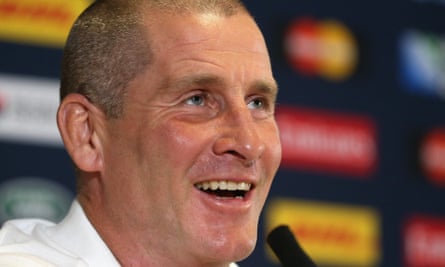
11. FIJI
▲ 2
They finished with a flourish but will wonder what might have been in any other of the pools. Some strong Uruguay defence meant there were only glimpses of the flair for which they are so popular but Leone Nakarawa continued to live up to the pre-tournament hype and while perhaps Nemani Nadolo did not, he had a couple of eye-catching runs. The real stars, though, have been in the front row with Campese Ma’afu, Manasa Saulo and Sunia Koto shining. The biggest challenge now is to hold on to John McKee as the head coach and continue to develop structurally while harnessing the undoubted natural talent at Fiji’s disposal rather than allowing watchful tier one admirers to tempt it away.
Fiji have now scored a try in their last 32 Test matches which is the longest run of all sides playing Test rugby.
12. GEORGIA
▲ 3
They arrived with just two World Cup wins to their name but leave with two more and, barring a shock win for Tonga against New Zealand, third place in their pool which guarantees a place at Japan 2019. The problem is what happens between now and then. The majority of their players, including the irrepressible Mamuka Gorgodze, go back to clubs in France and will continue to improve but what of the national team? Gorgodze was instrumental in the one-point win over Namibia, scoring his side’s first try while he and mainly a second-string pack pushed New Zealand all over the place in Cardiff. Shame on the Six Nations if they do not now take Georgia seriously.
Gorgodze scored his third Rugby World Cup try against Namibia. No other player has more than one for Georgia.
13. ITALY
▼ 1
Very little of their seven-point defeat to Ireland will make it on to any highlights reels but it was markedly improved from the Azzurri’s previous showings. Of course, having Sergio Parisse back was a huge help but so was the fact that Italy know how to approach these sort of matches. They are used to playing the underdogs against European heavyweights and can often run them close – they would have been far closer to France if they had not got so far on the wrong side of Craig Joubert – but it is Italy’s inability to build on that platform which will eternally frustrate.
Exeter Chiefs’ new signing Michele Campagnaro made the most metres (64) and the most tackles (17) in his side’s 16-9 defeat by Ireland.
Next match Romania, Sunday 11 October (Pool D)
14. TONGA
▶◀
Barring the unlikeliest of bonus point victories against New Zealand on Friday, Tonga are set to join their fellow islanders Fiji in finishing fourth with just one win from four matches. It has been hard for Tonga ever since their opening defeat by Georgia but after seeing off the challenge of Namibia they stuck to the task against Argentina manfully although were chronically let down by Kurt Morath’s errant boot. Judging by the 2011 World Cup opener they will at least need no extra motivation against New Zealand.
Telusa Veainu has averaged 130 metres made in his two matches at this World Cup.
Next match New Zealand, Friday 9 October (Pool C)
15. ROMANIA
▲ 2
A first World Cup victory since 2007 and in doing so the greatest comeback in the history of the tournament - not even France against the All Blacks was from a deficit of 15 points but, with less than half an hour to go, two tries from the captain Mihai Macovei and a nerveless late penalty from Florin Vlaicu keeps alive their hopes of finishing third in Pool D. They will have to beat Italy on Sunday to achieve it but they will not be short on confidence and Lynn Howells’ decision to extend his contract is a huge boost, regardless.
Romania made just 274 metres compared to Canada’s 527 in their 17-15 victory in Pool D.
Next match Italy, Sunday 11 October (Pool D)
16. SAMOA
▼ 5
Thoroughly disappointing. Perhaps they underestimated Japan but a glaring lack of discipline that led to three yellow cards, meant they had no chance of maintaining their already slimming hopes of reaching the quarter-finals. Alesana Tuilagi’s five-week ban has enraged a number of former players but whatever the conspiracy theorists say Samoa cannot give away so many penalties and expect to win matches. The head coach, Stephen Betham, has an air of resignation about him and on the evidence so far you cannot see them turning things around against Scotland.
Samoa conceded 19 penalties in their 26-5 defeat at the hands of Japan, who gave away just four.
Next match Scotland, Saturday 10 October (Pool B)
17. CANADA
▼ 1
What might have been for Canada. Their two losing bonus points is no consolation for a side that will feel they could have easily beaten both Italy and certainly Romania, having led 15-0. Kieran Crowley, the head coach, called it naivety and he has been vocal in calling for Canada to play tier-one sides more often but you have to feel for them. In DTH van der Merwe, though, they have arguably the star of the pool stages, becoming only the second player to score in all four pool matches after Wales’s Shane Williams.
Jamie Cudmore made his 14th World Cup appearance against Romania to equal Rod Snow’s national record for Canada.
18. NAMIBIA
▲ 1
The record extends to 19 World Cup matches without a victory and will surely be 20 against Argentina on Sunday but Namibia continue to win a wealth of admirers for their remarkable spirit, again demonstrated in their 17-16 defeat by Georgia. In that match they did at least collect a first World Cup point and did so after Jacques Burger had been replaced after just 10 minutes, demonstrating that while he is their talisman, there is further talent in the ranks. Burger misses out on Sunday meaning he has played his last World Cup match – the tournament will be all the poorer without him.
Namibia missed out on a first World Cup win but that they led at half-time against Georgia, 6-0, was the first time they had done so.
Next match Argentina, Sunday 11 October (Pool C)
19. USA
▼ 1
They started brightly enough against South Africa but were unable to make the most of it, largely as a result of poor kicking from hand though they might have made a better first of it had Bryan Habana been shown a yellow card for taking Blaine Scully out. Mike Tolkin made little secret of the fact that he was saving a lot of his squad for Sunday’s final clash with Japan but they will have to improve their discipline if they are to claim a first victory. In the longer term USA should benefit from the mooted Pan-American Six Nations – a lot of their players are sevens specialists and have looked brutally exposed at XVs at times.
The 64-0 defeat to the USA was the first time any side had failed to score a point at the tournament – the previous worst being Uruguay’s three against Australia.
Next match Japan, Sunday 11 October (Pool B).
20. URUGUAY
▶◀
Despite England’s travails they will close their campaign on Saturday with four defeats from four but Uruguay have not been the cannon fodder many predicted. Against Fiji, some ugly indiscipline crept in but they scored two tries having not managed one at the World Cup since 2003. Abrasive defence, led by the outstanding blindside Juan Manuel Gaminara, ensured Fiji had to grind for large parts on Tuesday and England can expect a similar workout. Agustín Ormaechea has the unwelcome label as the only player sent off so far but at least he has been cleared to play against England.
Carlos Arboleya’s try against Fiji was Uruguay’s first at the World Cup since 2003 when Pablo Lemoine, the current coach, went over in a 111-13 defeat by England.
Next match England, Saturday 10 October Pool (A)
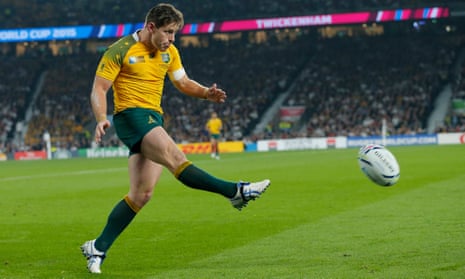
Comments (…)
Sign in or create your Guardian account to join the discussion